Explaining the Coroner: Understanding a Crucial Death Investigator's Role
The coroner definition refers to a public official whose primary duty is to investigate deaths that appear unnatural, suspicious, or violent.
A coroner is a usually elected public officer who is typically not required to have specific medical qualifications and whose principal duty is to inquire by inquest into the cause of any death which is not due to natural causes.
Here's what you need to know about coroners:
| Aspect | Description |
|---|---|
| Official Role | Public official who investigates and certifies certain deaths |
| Main Duties | Conducts inquests, determines cause and manner of death |
| Types of Deaths | Investigates sudden, violent, suspicious, or unnatural deaths |
| Origin | From Latin "corona" (crown); originated in medieval England (1194) |
| Qualifications | Varies by jurisdiction; may be elected or appointed |
| Difference from ME | Medical Examiners are typically physicians; coroners often aren't required to have medical training |
When someone dies unexpectedly or under suspicious circumstances, a coroner steps in to answer the crucial questions of how and why. Unlike a regular physician who might sign a death certificate for natural causes, coroners handle the cases that raise eyebrows - violent deaths, accidents, suicides, and situations where the cause isn't immediately clear.
The role dates back to medieval England, where "crowners" (the original term) represented the king's interests in death investigations. Today's coroners maintain that tradition of public service, though their qualifications and powers vary significantly between jurisdictions.
I'm Mortuary Cooler, with over 15 years of experience working with medical examiners and coroners across the United States, helping them understand the proper coroner definition and providing specialized equipment for their vital work. My expertise comes from collaborating directly with death investigation professionals to design and implement proper body storage solutions.
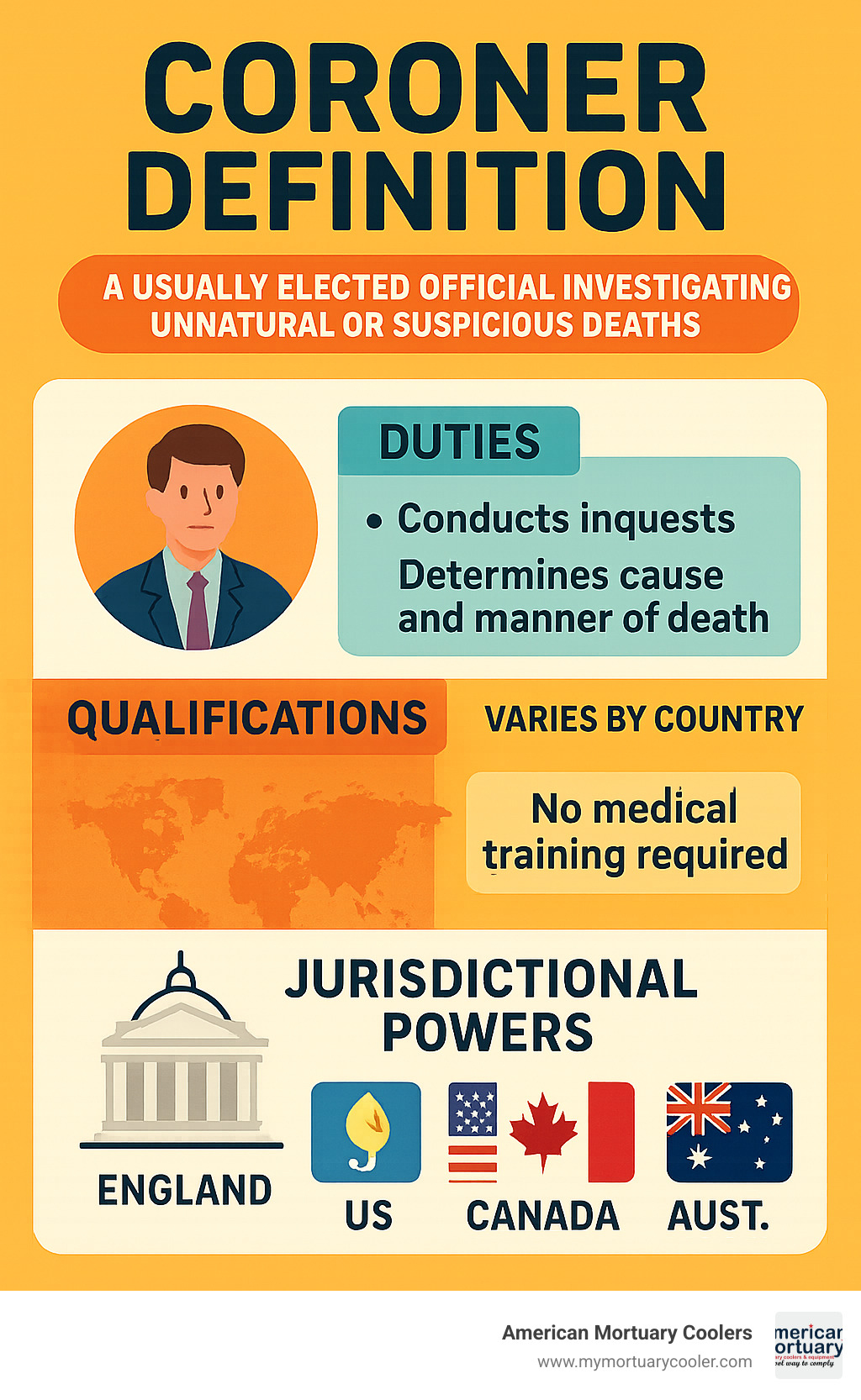
Coroner definition glossary:
What Is a Coroner? The Official Coroner Definition
When someone dies unexpectedly or under suspicious circumstances, who steps in to find answers? That's where the coroner comes in. The coroner definition at its heart refers to a county or government official with a vital public duty: investigating deaths that aren't clearly natural.
Think of coroners as death detectives. They step in when someone dies violently, mysteriously, or in ways that raise questions. Their job? To determine what happened and why.
The word "coroner" itself has royal roots, coming from the Latin "corona" meaning "crown." This makes perfect sense historically—in medieval England, these officials (then called "crowners") represented the king's interests when someone died unexpectedly. They were the Crown's eyes and ears in death investigations.
Today's coroner definition covers several important responsibilities that serve both justice and public health:
They investigate deaths that seem suspicious, violent, or unexpected. They conduct inquests, sometimes with a jury of ordinary citizens. They determine and officially certify how and why someone died. When bodies can't be identified, they work to find who the person was. They notify families of their loss. And they safeguard the deceased's belongings until they can be properly handled.
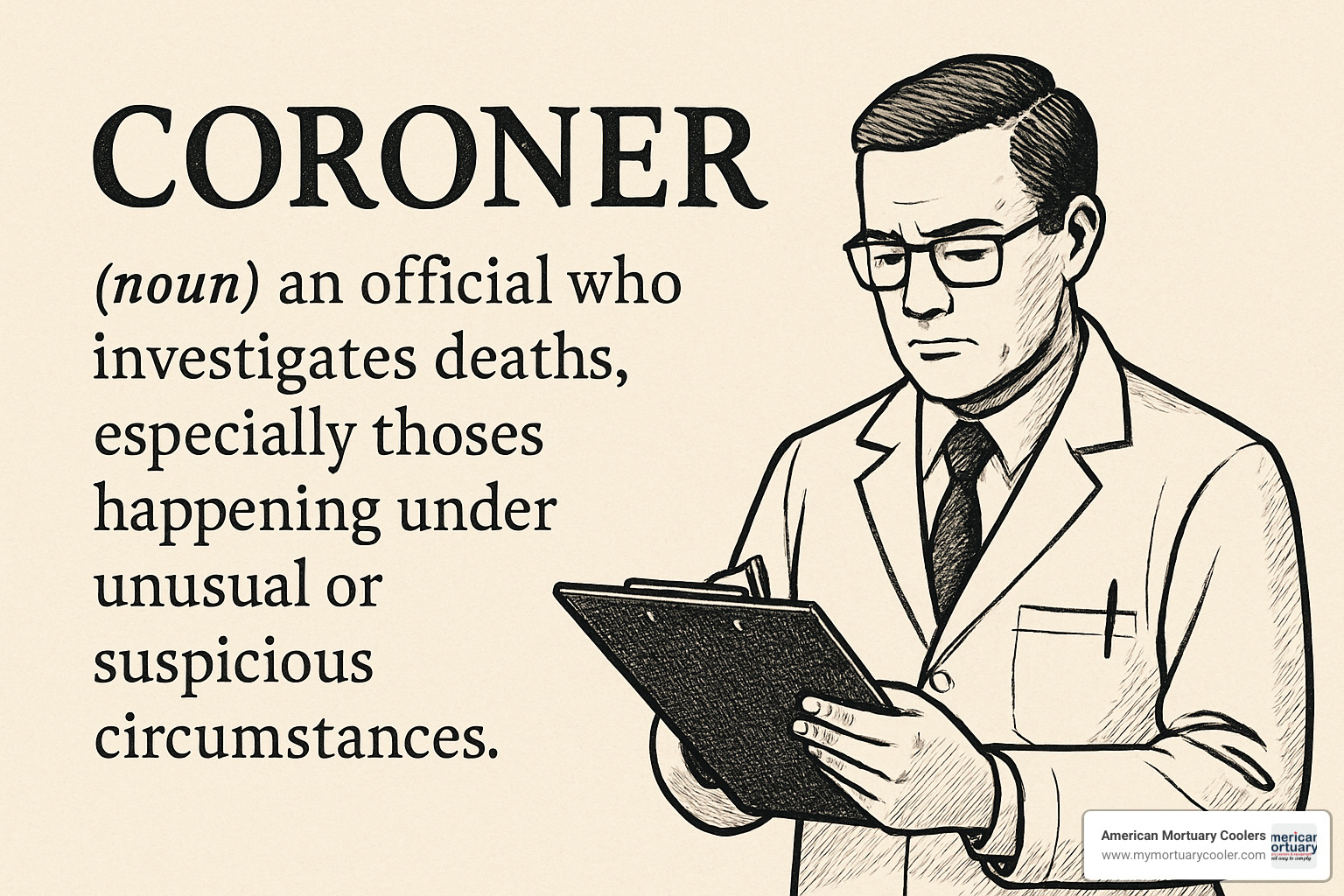
Legal wording of the coroner definition
Legal definitions are rarely light reading, and the coroner definition is no exception. In legal terms, coroners are typically described as independent judicial officers with specific investigative powers granted by law.
Back in medieval times, coroners were officially known as "custos placitorum coronae" or "keeper of the pleas of the Crown." This fancy Latin title reflected their original job: making sure the king got any money he was entitled to when someone died suspiciously (yes, the Crown could claim property in certain death cases!).
Modern legal definitions make an important distinction between two key terms:
- Cause of death: The specific disease or injury that led to death (like "gunshot wound to the chest")
- Manner of death: How it happened (natural, accident, suicide, homicide, or undetermined)
Coroners have the legal authority to determine both—a power that can dramatically affect families, criminal cases, and insurance claims.
Ohio's law provides a good example of when coroners get involved. Their Revised Code 313.12 requires notification to the coroner when deaths happen through "criminal or other violent means, by casualty, by suicide, or in any suspicious or unusual manner," when someone in apparent good health dies suddenly, or when a person with developmental disabilities dies regardless of circumstances.
Everyday use of the coroner definition in news reports
We've all seen headlines mentioning coroners. In news reports, the coroner definition gets simplified to "the official who determines cause of death"—which isn't wrong, just incomplete.
When reading your local paper or watching the evening news, you'll often hear phrases like "The coroner ruled the death a homicide" or "According to the coroner, the victim died from asphyxiation." These statements reflect the coroner's authority to make official determinations that can set criminal investigations in motion or bring them to a close.
Coroners also play a crucial role in public health. When a newspaper reports "The coroner's office listed fentanyl as a cause in 47 of 227 homeless deaths in Sacramento County last year," they're highlighting how coroners track emerging health crises like the opioid epidemic.
In some places, coroners even issue public health warnings. A CBC report might note, "The provincial coroner has issued an alert about a particularly potent batch of street drugs after investigating six overdose deaths in one week." This public health role shows how coroners don't just serve the dead—they help protect the living too.
From Medieval Crowner to Modern Fact-Finder: A Brief History
The story of the coroner begins in the misty days of medieval England, where the position was officially established in 1194 under King Richard I (the Lionheart) through the Articles of Eyre. Back then, they weren't called "coroners" but "crowners" or "coronators" – literally the king's representatives, with a primary mission that had more to do with royal finances than medical science.
These early crowners had a fascinating job description that might surprise modern readers. Their main duties included investigating suspicious deaths, but not primarily for justice – they needed to determine if the Crown could claim any property through "deodand" (items that caused a death were forfeited to the king). They also served as a check on powerful sheriffs, who sometimes abused their authority, and kept records of criminal matters including the colorful practice of "hue and cry" – the medieval version of a neighborhood watch where citizens would shout to alert others when pursuing criminals.
"The position of coroner is older than the Magna Carta," explains historian Dr. Ian Mortimer. "Few public offices can claim such longevity or such evolution in purpose."
Over centuries, the coroner definition transformed alongside advances in medical science and changing social priorities. By the time the Coroners Amendment Act of 1926 was passed in England, the role had been modernized and streamlined, focusing primarily on conducting inquests into deaths that were violent, unnatural, or unexplained.
When the American colonies were established, they brought the coroner system with them from English common law. However, like many transplanted institutions, it took root differently across various states and jurisdictions. Today, about half of U.S. states maintain a traditional coroner system, while others have shifted to a medical examiner model or adopted hybrid approaches that combine elements of both.
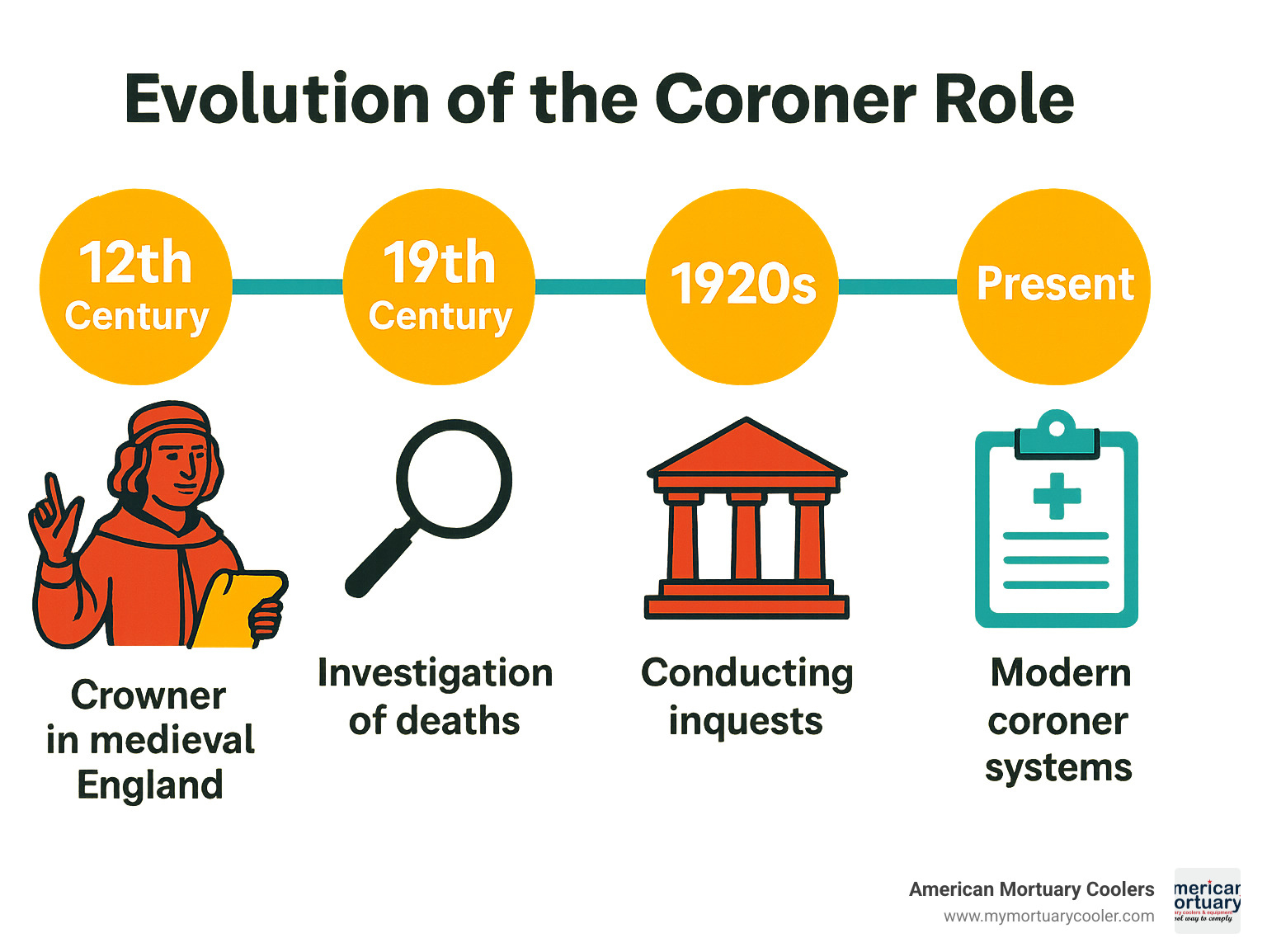
How the coroner definition evolved over centuries
The evolution of the coroner definition tells a fascinating story of how one of our oldest public offices adapted to meet changing needs:
In the 12th-13th Centuries, the crowner was essentially a royal tax collector with a morbid specialty. When someone died unexpectedly, the crowner would investigate to see if any property involved in the death could be claimed by the Crown. If your ox cart ran over someone, you might lose the cart to the king – a concept called "deodand" that seems strange to modern sensibilities.
During the 14th-17th Centuries, as governance evolved, so did the coroner's role. Their duties expanded beyond revenue collection to include broader death investigations. Coroners began conducting formal inquests with juries of local men to determine how someone died – a practice that continues in modified form today. They also served as an important check on the sheriff's power, ensuring local law enforcement remained accountable.
The 18th-19th Centuries brought the scientific revolution, and coroners began partnering more closely with physicians. The focus shifted toward determining accurate causes of death rather than securing royal revenue. This period saw the beginnings of forensic medicine as we know it today.
By the 20th Century, many jurisdictions began requiring coroners to have medical or legal qualifications. This professionalization period also saw the emergence of the medical examiner system as an alternative, with some areas preferring appointed medical professionals over elected coroners. The debate over which system better serves the public interest continues to this day.
In our 21st Century world, the modern coroner incorporates cutting-edge forensic science, contributes to public health surveillance, and develops specialized skills for mass casualty events. Many jurisdictions are reassessing whether the traditional coroner system or the medical examiner model better serves contemporary needs.
Through it all, the core purpose has remained: to speak for those who can no longer speak for themselves and to answer the essential questions surrounding unexpected deaths.
Duties, Powers, and Processes of a Coroner
When someone dies unexpectedly, the coroner steps in as the community's official fact-finder. Their role combines elements of detective work, medical knowledge, and public service—all focused on answering crucial questions about how and why a person died.
The modern coroner wields significant authority when it comes to death investigations. They can take immediate control of a death scene, preserving evidence that might otherwise be lost. Once they arrive, the coroner definition includes legal custody of the deceased's body—a responsibility they maintain until their investigation concludes and they can release the remains to waiting family members.
When questions arise about the cause of death, coroners have the power to order autopsies—detailed medical examinations that can reveal hidden injuries or disease processes. In some jurisdictions, their authority extends to issuing warrants related to death investigations, allowing them to access records or evidence that might otherwise be protected.
One of the most solemn powers a coroner holds is the ability to summon witnesses and question them under oath during an inquest. These formal proceedings help establish the truth about questionable deaths, with the coroner (sometimes alongside a jury) ultimately determining the official cause and manner of death.
Beyond individual cases, coroners serve a vital public health function by collecting and analyzing death data that can reveal concerning trends—like clusters of overdoses or unexpected disease outbreaks—before they become widespread public health emergencies.
For those working in the funeral industry or death care, understanding how morgues operate is essential. More info about morgue equipment can provide valuable insight into the technical aspects of body preservation during these critical investigations.
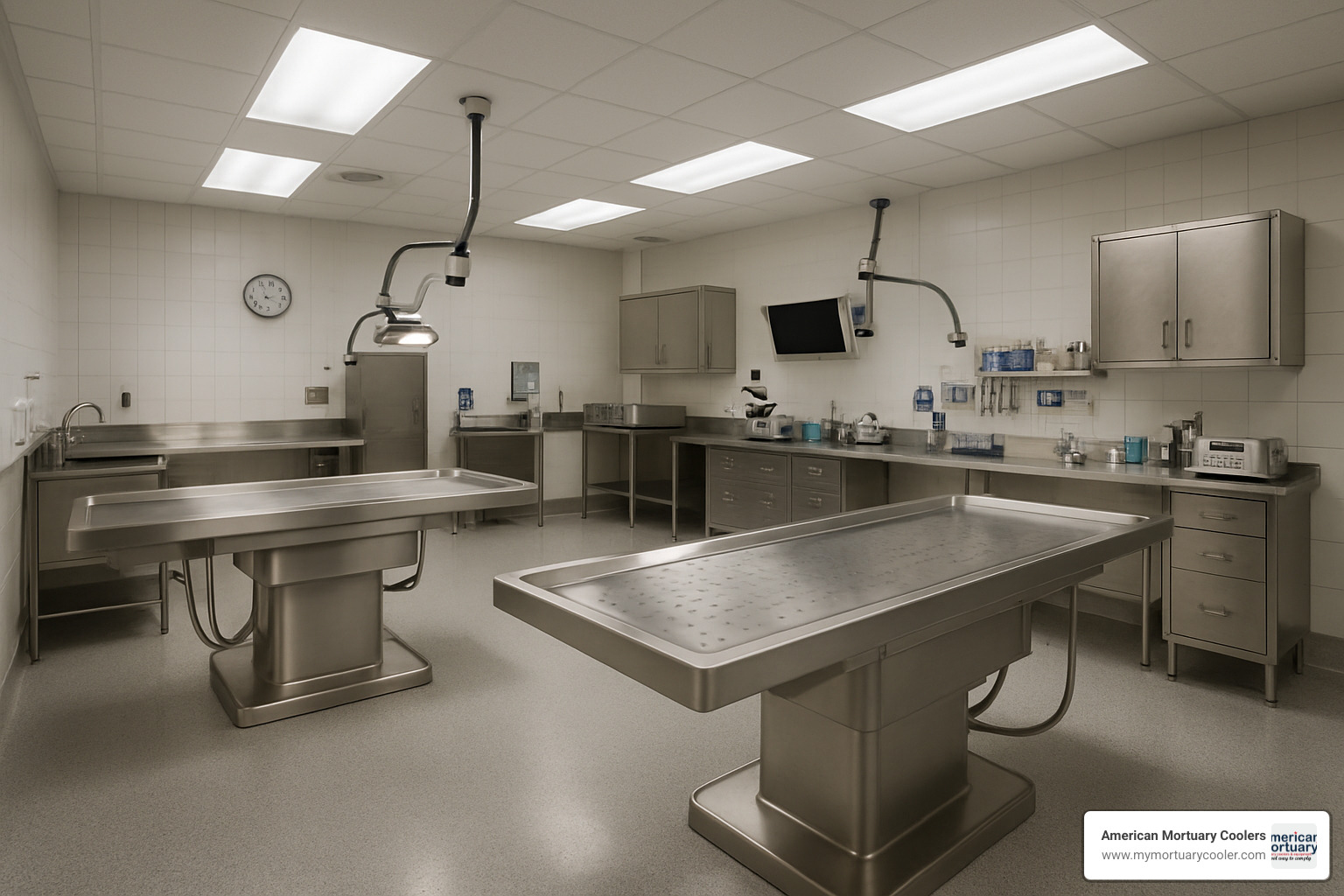
Inside a modern inquest: applying the coroner definition today
When a death requires investigation, the coroner definition comes to life through a structured process designed to uncover truth while treating the deceased with dignity and their loved ones with compassion.
It begins with a phone call—notification that someone has died under circumstances requiring official scrutiny. The coroner or their deputy quickly responds to the scene, examining both the body and surrounding evidence with a trained eye. After this initial assessment, they arrange transportation to their facility, where the real detective work begins.
At the morgue, the coroner conducts a preliminary examination, deciding whether a full autopsy is necessary. For complex cases, a forensic pathologist might perform this detailed internal examination, looking for clues the body holds about its final moments. Throughout this process, they carefully collect evidence—toxicology samples that might reveal poisons or drugs, photographs documenting injuries, and other physical evidence that tells the story of the death.
The investigation extends beyond the physical to include interviews with witnesses, family members, and medical providers who might shed light on the circumstances. In particularly complex or high-profile cases, the coroner might convene a formal inquest with a jury to hear testimony and examine evidence in a more structured setting.
After gathering all available information, the coroner makes their official determination, signing the death certificate and releasing the remains to the family for funeral arrangements. Finally, they file a detailed report documenting their findings—creating a permanent record that may serve legal, medical, and historical purposes for years to come.
Cause of death vs. manner of death
At the heart of the coroner definition lies a crucial distinction that often confuses the public but forms the foundation of death investigation: the difference between cause and manner of death.
The cause of death is the specific medical reason a person died—the disease or injury that set in motion the events leading to death. This might be a heart attack, a gunshot wound, cancer, or any number of medical conditions. It answers the question: "What physiologically stopped this person's body from functioning?"
The manner of death is broader, categorizing how the death occurred. In most jurisdictions, coroners use five standard classifications:
Natural deaths result solely from disease processes or aging—the body simply wearing out or succumbing to illness without external forces. A heart attack in an elderly person with coronary disease typically falls here.
Accidental deaths occur when unintentional injuries prove fatal—a car crash, a fall down stairs, or an accidental overdose.
Suicide indicates the deceased intentionally took actions to end their own life, a determination requiring evidence of both intent and self-inflicted injury.
Homicide means one person caused another's death, regardless of intent or criminal liability. This is a medical classification, not necessarily a criminal one—justifiable homicides are still classified as homicides by coroners.
Undetermined serves as an honest acknowledgment that sometimes, despite thorough investigation, the evidence simply doesn't support a definitive conclusion about how death occurred.
This distinction has profound implications. A gunshot wound to the head might be the cause of death, but whether it represents suicide, homicide, or a tragic accident dramatically changes how families, insurance companies, and the legal system respond. The coroner's careful determination brings clarity to these difficult questions, helping communities process loss and move forward with truth.
Coroner vs. Medical Examiner: Key Differences Around the World
One of the most important distinctions in death investigation systems is between coroners and medical examiners. While both investigate deaths, there are fundamental differences in their qualifications, appointment methods, and approach:
| Aspect | Coroner | Medical Examiner |
|---|---|---|
| Qualifications | Varies widely; may have no medical training | Always a physician, typically a forensic pathologist |
| Selection | Often elected; sometimes appointed | Typically appointed |
| Medical Training | Not always required | Required (MD/DO plus specialty training) |
| Performs Autopsies | May contract with pathologists | Performs own autopsies |
| Jurisdictional Basis | Often county-based | Often regional or state-based |
| Historical Origin | Medieval England | Reform movement of early 20th century |
Some jurisdictions have hybrid systems, such as the sheriff-coroner model where the elected sheriff also serves as coroner. Others maintain both systems in different regions or for different types of cases.
For a deeper scientific perspective on death investigation systems, scientific research on death-investigation systems provides evidence-based comparisons of different approaches.
The coroner definition in the United States, UK, Canada, Australia
The coroner definition varies significantly between countries and even within regions of the same country:
United States: About half of U.S. states use a coroner system, while others use medical examiners or a hybrid approach. In coroner states, qualifications vary dramatically—some require only that the coroner be an adult resident of the county, while others mandate medical or legal training. Coroners are typically elected county officials.
United Kingdom: In England and Wales, there are 98 coroners covering 109 local authority areas. UK coroners must be qualified lawyers, doctors, or both, with at least 5 years of experience. They are appointed rather than elected and function as independent judicial officers.
Canada: Most Canadian provinces and territories use a coroner system, while Alberta, Manitoba, Nova Scotia, and Newfoundland and Labrador use medical examiners. Canadian coroners are appointed by provincial order in council and may be physicians, lawyers, or other qualified professionals depending on the province.
Australia: Australia uses both coroner and medical examiner systems depending on the state or territory. Coroners are typically magistrates or legal professionals who work within the court system.
These variations reflect different historical developments, legal traditions, and approaches to death investigation in each country.
Why some jurisdictions are shifting to medical examiner systems
There's a growing trend in many jurisdictions to transition from traditional coroner systems to medical examiner models. Several factors are driving this shift:
Medical Expertise: Medical examiners bring specialized medical knowledge to death investigations, potentially increasing accuracy.
Standardized Training: Medical examiners have standardized medical training and forensic pathology certification.
Political Independence: As appointed professionals rather than elected officials, medical examiners may be less susceptible to political pressures.
Consistency: Medical examiner systems often provide more consistent approaches to death investigation across jurisdictions.
Resource Efficiency: Regional medical examiner systems can sometimes provide more efficient service than county-by-county coroner systems.
However, the transition isn't without challenges. Medical examiner systems typically cost more to operate than coroner systems, and rural areas may struggle to recruit qualified forensic pathologists. Additionally, some argue that elected coroners maintain an important connection to local communities that appointed medical examiners might lack.
Over half of the U.S. population is currently served by medical examiner systems, and this percentage is expected to grow as more jurisdictions consider modernizing their death investigation processes.
Path to the Badge: How to Become a Coroner
So you're curious about becoming a coroner? It's a fascinating career path that looks quite different depending on where you live. In some places, you might need nothing more than a winning smile and a successful election campaign. In others, you'll need years of specialized education before you can even apply.
Let me walk you through what this journey typically looks like across different regions.
In many U.S. counties, becoming a coroner is primarily a matter of winning an election. The basic requirements are usually pretty straightforward – you need to be at least 18 or 21 years old, live in the county you're running in, have a clean criminal record (no felonies), and convince enough voters to check your name on the ballot. It's democracy in action, though some might question whether popularity should be the main qualification for such a technical role.
For appointed positions, the process tends to be more rigorous. You'll need to meet specific educational requirements (which vary widely), submit an application when a position opens up, and impress whoever has appointment power – typically a county commission or executive.
Educational backgrounds that serve aspiring coroners well include medicine (especially pathology), law, forensic science, criminal justice, and mortuary science. In jurisdictions with higher standards, one of these fields might be required rather than just recommended.
When it comes to compensation, the range is enormous. In small, rural counties where the position is part-time, a coroner might earn just a few thousand dollars annually. Meanwhile, full-time coroners in large jurisdictions can pull in six-figure salaries commensurate with their responsibilities and qualifications.
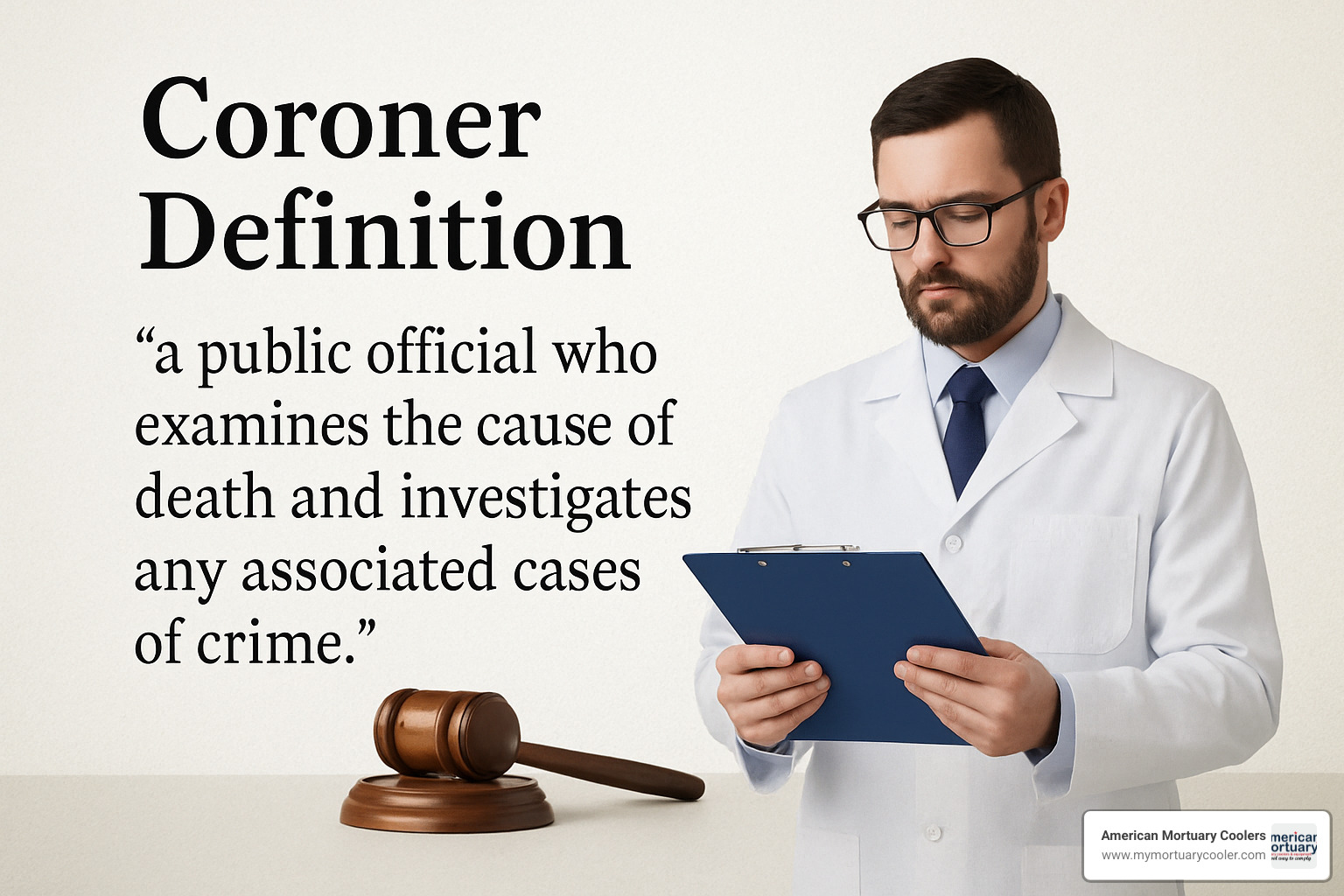
Meeting the coroner definition: minimum credentials by region
The coroner definition varies dramatically when it comes to required qualifications:
In England and Wales, the bar is set quite high. Coroners must be qualified lawyers, doctors, or both, with at least 5 years of professional experience under their belt. They're appointed by local authorities and must receive approval from the Lord Chancellor. No popularity contests here – it's all about credentials.
Canadian requirements change depending on which province you're in. Ontario demands that coroners be licensed physicians, while Quebec typically appoints lawyers or physicians to the role through a government selection process.
The United States is where things get really interesting. Some states have virtually no specific qualifications – if you're an adult who lives in the county, you're eligible. Others might require a high school diploma or mandate specific training after election. A handful of states do require medical, legal, or forensic science degrees. And just to keep things interesting, states like Kansas, Louisiana, and Nebraska sometimes allow sheriffs to serve as coroners on the side (ex officio coroners).
In Australia, coroners are typically magistrates or legal professionals appointed to the Coroner's Court, maintaining the position's judicial character.
This wide variance in qualifications has sparked ongoing debates about whether the role should be standardized and professionalized, especially in places where someone with minimal training can be responsible for determining cause of death.
Future skills for coroners in a high-tech era
The modern coroner needs to keep pace with rapidly evolving technology. Tomorrow's death investigators will need skills that would have seemed like science fiction just a few decades ago.
Digital forensics is becoming essential as our lives move increasingly online. Coroners need to understand how to preserve and analyze evidence from social media accounts, fitness trackers, and even smart home devices that might provide crucial clues about someone's final moments.
Advanced imaging technologies are changing how bodies are examined. Virtual autopsies using CT scans and MRIs can sometimes replace or supplement traditional cutting, giving families options that respect religious or cultural objections to autopsy.
Understanding genetic analysis is becoming important too. Genetic testing can reveal hereditary conditions that contributed to death or help identify remains when other methods fail.
Modern coroners also need strong data analysis skills to spot patterns that might indicate emerging public health threats – whether that's a new street drug or an undetected environmental hazard.
When disaster strikes, crisis communication skills become vital. Coroners often find themselves speaking to the media during mass casualty events or high-profile cases, requiring both sensitivity and accuracy under pressure.
Our increasingly diverse society demands cultural competence from death investigators. Understanding different cultural and religious practices around death ensures respectful handling of both the deceased and their grieving families.
Finally, artificial intelligence is making inroads into death investigation. Future coroners will likely work with AI tools that assist with cause of death determination and help identify patterns that human observers might miss.
The fundamentals of the coroner's mission remain unchanged – determining the truth about how and why people die. But the tools and techniques for fulfilling that mission continue to evolve, making this ancient profession surprisingly cutting-edge.
Frequently Asked Questions About the Coroner Definition
Curious about what exactly coroners do and when they get involved? You're not alone. Here are answers to some of the most common questions people have about coroners and their important work.
What kinds of deaths automatically go to a coroner?
Not every death requires a coroner's attention. However, certain situations automatically trigger a call to the coroner's office.
When someone dies violently—whether by homicide, suicide, or accident—the coroner steps in. They're also called when someone passes away suddenly while seemingly in good health, or when a person dies without having seen a doctor recently.
Deaths in jail cells, prison, or police custody always warrant a coroner's investigation. The same goes for workplace fatalities, deaths during medical procedures, and cases where the deceased can't be identified.
In many places, coroner definition extends to investigating deaths of children under specific circumstances. In Ohio, for example, any child under two years old who dies suddenly while appearing healthy must be reported to the coroner, as must any death of a person with developmental disabilities.
Public health concerns can also bring in the coroner—if someone dies from what might be a contagious disease that poses a community threat, the coroner needs to know.
Can a coroner arrest someone or issue warrants?
While today's coroners primarily focus on determining cause and manner of death, some do retain surprising legal powers that harken back to their historical roles.
In certain U.S. states, the coroner definition includes limited law enforcement authority. Some coroners can issue arrest warrants related to deaths they're investigating or detain witnesses for questioning. These powers stem from the coroner's medieval role as a check on the sheriff's authority—in fact, coroners in medieval England could even arrest the sheriff if necessary!
Most modern coroners work alongside law enforcement rather than acting as officers themselves. They provide crucial evidence and testimony that might lead to arrests, but typically leave the handcuffs to the police. Even in jurisdictions where coroners technically retain these powers, they rarely exercise them in practice.
Do coroners always perform autopsies themselves?
Despite what crime shows might suggest, most coroners don't personally perform autopsies. In fact, many legally can't.
Unless a coroner happens to be a physician (and many aren't required to be), they'll contract with forensic pathologists to perform the actual autopsy procedures. Even coroners who are doctors might not have specialized training in forensic pathology, so they often refer complex cases to experts.
The coroner definition includes the authority to order an autopsy and oversee the death investigation, but the technical medical work is frequently done by specialists. This division of labor makes practical sense—in busy jurisdictions handling thousands of deaths annually, it would be impossible for one person to perform all necessary examinations.
Some states simplify this by establishing regional autopsy centers or having a state medical examiner who performs or supervises autopsies for coroner cases. This arrangement combines the coroner's legal authority with specialized medical expertise for more thorough investigations.
At American Mortuary Coolers, we work closely with coroners across the country, providing them with the specialized equipment they need to properly preserve bodies during these critical investigations. Our mortuary coolers are designed to meet the unique needs of death investigation professionals, ensuring dignity for the deceased and accuracy for the investigation.
Conclusion
When we talk about the coroner definition, we're describing much more than just someone who determines how people died. These public officials represent one of our oldest civic institutions, with roots stretching back to medieval England when "crowners" served the Crown by investigating suspicious deaths.
Today's coroners stand at a unique intersection of law, medicine, and public service. They give voice to those who can no longer speak for themselves, bringing clarity to families during their darkest moments while simultaneously serving the broader community's need for justice and public health protection.
Throughout this article, we've seen how the role has evolved over centuries while maintaining its core purpose: finding the truth about deaths that raise questions. Whether determining if an overdose was accidental or identifying a pattern of fatalities that signals a public health crisis, coroners perform work that touches on our most fundamental concerns about mortality and justice.
The diversity in how different regions define and structure the coroner's office reflects our varying approaches to death investigation. Some jurisdictions elect community members with minimal qualifications, while others appoint highly trained professionals. Some regions are transitioning to medical examiner systems, while others maintain the traditional coroner model that has served communities for generations.
What remains consistent is the essential nature of this work. Behind every death certificate signed by a coroner lies a process of investigation, evidence gathering, and professional judgment that brings closure to families and contributes valuable data to our understanding of preventable deaths.
At American Mortuary Coolers, we're proud to support coroners across the nation with equipment that helps maintain the integrity of their investigations. Our Tennessee-crafted mortuary coolers are designed with the specific needs of death investigators in mind. For professionals in this field looking for reliable equipment, more info about our mortuary coolers is just a click away.
The next time you hear the term "coroner" mentioned in a news report or true crime podcast, I hope you'll remember the rich history and vital importance of this ancient office that continues to serve our modern need for truth and justice when death occurs under questionable circumstances.


















